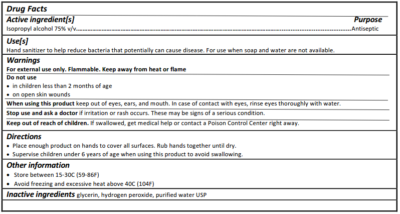
In response to recent COVID events, many manufacturers had to act fast about how to manage the hand sanitizer shortage amid the price gouging for some very basic ingredients. While many manufacturers adhered to the World Health Organization’s (WHO) formula, many didn’t. The FDA has now confirmed cases of blindness and death as a result of improperly formulated hand sanitizer.
In case you didn’t know, anything you put on your skin may be absorbed, and hand sanitizer is no exception. While many people already know this, not all types of alcohol are equally safe.
When COVID first became a nasty word and changed our world forever, price gouging on basics like 99% isopropyl alcohol became rampant. Actually, not just alcohol, but all ingredients to make hand sanitizer experienced price spikes. This includes glycerin, food grade hydrogen peroxide, and of course all forms of alcohol. While hand sanitizer was missing from every shelf, many manufacturers became creative in trying to meet demand. While the FDA announced they will relax some of their manufacturing regulations, they meant registration of production facilities, not changing the formulas.
*Of note, major manufacturers are also at fault for the shortages and price gouging. Here at Nature’s Complement, we made several attempts at ordering bulk quantities of quality 99% isopropyl alcholol, only to have our order cancelled due to supposed shortages. We would find out later that the same manufacturer all of a sudden started selling hand sanitizer at a price much higher than the isopropyl alcohol cost in bulk. Meaning they didn’t sell the isopropyl alcohol to others, because they wanted to get in on the hand sanitizer band wagon themselves.
So what were manufacturers and re-sellers to do? Improvise of course. Unfortunately, this resulted in some people going blind, and even some people dying, as a result of hand sanitizers that were contaminated with methanol.
Methanol, sometimes also referred to as wood alcohol, is still an alcohol, but a dangerous one. Methanol is also similar to ethanol (drinking alcohol). But unlike ethanol, methanol is not an alcohol you want to drink. “As little as 10 mL (0.34 US fl oz) of pure methanol can cause permanent blindness by destruction of the optic nerve. 30 mL (1.0 US fl oz) is potentially fatal. The median lethal dose is 100 mL (3.4 US fl oz), i.e., 1–2 mL/kg body weight of pure methanol“1Wikipedia Contributors. “Methanol.” Wikipedia, Wikimedia Foundation, 13 Mar. 2019, en.wikipedia.org/wiki/Methanol.
As little as 1/3 oz (10 mL) can result in blindness. That is not a large amount. For comparison, 1.5 ounces of distilled spirits, which is about 40% alcohol, is considered a standard size drink. And unfortunately, some children AND adults are choosing to drink hand sanitizer because they think it’s made of ethanol per the label, when it turns out to contain methanol, or at least contaminated with methanol.
The FDA has now flagged over 50 brands of hand sanitizer and asked that they be pulled from sale. But unfortunately some manufacturers haven’t yet complied. Even worse, some manufacturers did not list methanol on the ingredient list, but instead listed ethanol. Without proper testing, an ordinary consumer would never be able to tell the difference – until they experienced side effects that is. For a full list of brands that tested positive for methanol contamination, you can click on the FDA’s site.
But just because you’re not drinking the hand sanitizer with the hope of getting intoxicated doesn’t mean you’re safe, because methanol (like many other things) can be absorbed through the skin. Even the FDA admits on their site that “all persons using these products on their hands are at risk for methanol poisoning”.2Research, Center for Drug Evaluation and. “FDA Updates on Hand Sanitizers with Methanol.” FDA, 17 July 2020, www.fda.gov/drugs/drug-safety-and-availability/fda-updates-hand-sanitizers-methanol. So if you notice symptoms such as nausea, headache, blurred vision, blindness, or seizures, you may want to seek immediate medical treatment to prevent further permanent damage to your nervous system.
So when choosing a hand sanitizer, remember not all of them are created equal, and reading ingredients is key. The WHO has made it clear to not add additional ingredients to their hand sanitizer formula, such as essential oils or fragrances. Any formula you buy should be simple to recognize as safe by simply turning it over, reading the ingredients, and seeing that it is made with either ethyl alcohol or isopropyl alcohol, along with glycerin, hydrogen peroxide, and water. Per FDA requirements, that label should look something like this:

If the alcohol is not identified, either don’t buy it or contact the manufacturer to find out what kind of alcohol was used.
While I have not heard of anyone ingesting isopropyl alcohol, it is worth pointing out that isopropyl alcohol and isopropyl based hand sanitizers are also not safe to ingest, but Isopropyl alcohol is relatively safer to use in hand sanitizers. “Poisoning can occur from ingestion, inhalation, or skin absorption”3Wikipedia contributors. (2020, July 25). Isopropyl alcohol. Wikipedia. https://en.wikipedia.org/wiki/Isopropyl_alcohol#Toxicology but “unlike methanol or ethylene glycol poisoning, the metabolites of isopropyl alcohol are considerably less toxic, and treatment is largely supportive”.4Wikipedia contributors. (2020, July 25). Isopropyl alcohol. Wikipedia. https://en.wikipedia.org/wiki/Isopropyl_alcohol#Toxicology Thus the preferred choice for hand sanitizers.
Also, people interested in getting intoxicated are less likely to consume isopropyl alcohol than ethyl alcohol. So if you’re concerned about someone in your home/family potentially attempting to drink the ethyl alcohol based hand sanitizer, perhaps only buy the isopropyl alcohol kind to prevent any temptation. Or if you use large amounts of hand sanitizer, stick to the isopropyl alcohol based sanitizer as an ethyl alcohol based sanitizer may be contaminated with methanol putting you at risk.
Choosing Hand Sanitizer Wisely
Read the ingredients list, not just the front label. The law is only specific to the ingredients list and “drug facts” portions of the label. Anything else on the label is fair game and manufacturers are allowed to lie to you, and they know it.
Remember false labeling. Not a single hand sanitizer brand is “FDA approved”. If you see FDA approved on the label, they are lying to you. Which should make you ask, “what else are they lying about?”
Consider price. While it’s terrible that companies are price gouging, it can be a confusing time when we live in a world where you generally get what you pay for. In this case, if the hand sanitizer is listed as containing ethyl alcohol, but the bottle is very inexpensive, consider what made it so inexpensive. Perhaps the addition of cheaper alcohol, such as methanol, has allowed the price to be so low.
Consider the brand and if you can trust them. Contrary to popular belief, many manufacturers usually don’t have your safety in mind. Instead, they only have your wallet in mind. Having been in this business for over four years now, I can tell you first hand what a struggle it is to find honest businesses, especially now. I probably spend more time researching raw ingredient producers now than I ever had to before COVID. While I completely understand the difficulty in finding raw ingredients in these strange times, it is even more important for manufacturers to be honest about their tactics, because so many are taking advantage of the circumstances.

Consider making your own. We provided detailed instructions for using either isopropopyl alcohol or ethyl alcohol, using the WHO’s formula. Now that the shelves are slowly recovering, finding these ingredients has become easier. Consider stocking up on 99% isopropyl alcohol, food grade hydrogen peroxide, and vegetable glycerin, along with some glass bottles with sprayers. If you have enough ingredients on hand to make your own, you won’t have to rely on anyone else who might inadvertently cause you or your family blindness, or worse yet, death.
And lastly, if you choose to drink, please don’t drink your hand sanitizer.

For Health,
Tober
Nature's Complement is a participant in the Amazon Services LLC Associates Program, an affiliate advertising program. If you purchase products on Amazon through any of our affiliate links, we get a small percentage of the transaction, at no extra cost to you. We spend a lot of time writing the articles on this site, and all this information is provided free of charge. When you use our affiliate links, you support the writing you enjoy without necessarily buying our products. (However we would appreciate if you would do that too!) Thank you for helping to support our work, however you choose to do so.
These statements have not been evaluated by the Food and Drug Administration. This information and/or products are not intended to diagnose, treat, cure or prevent any disease.
References
| ↑1 | Wikipedia Contributors. “Methanol.” Wikipedia, Wikimedia Foundation, 13 Mar. 2019, en.wikipedia.org/wiki/Methanol. |
|---|---|
| ↑2 | Research, Center for Drug Evaluation and. “FDA Updates on Hand Sanitizers with Methanol.” FDA, 17 July 2020, www.fda.gov/drugs/drug-safety-and-availability/fda-updates-hand-sanitizers-methanol. |
| ↑3, ↑4 | Wikipedia contributors. (2020, July 25). Isopropyl alcohol. Wikipedia. https://en.wikipedia.org/wiki/Isopropyl_alcohol#Toxicology |


